Bye Bye Biddy: A Presidential Exit Interview
As her last year at Amherst comes to a close, The Student sat down with President Biddy Martin to discuss her life of learning and the legacy of her tenure at the college.
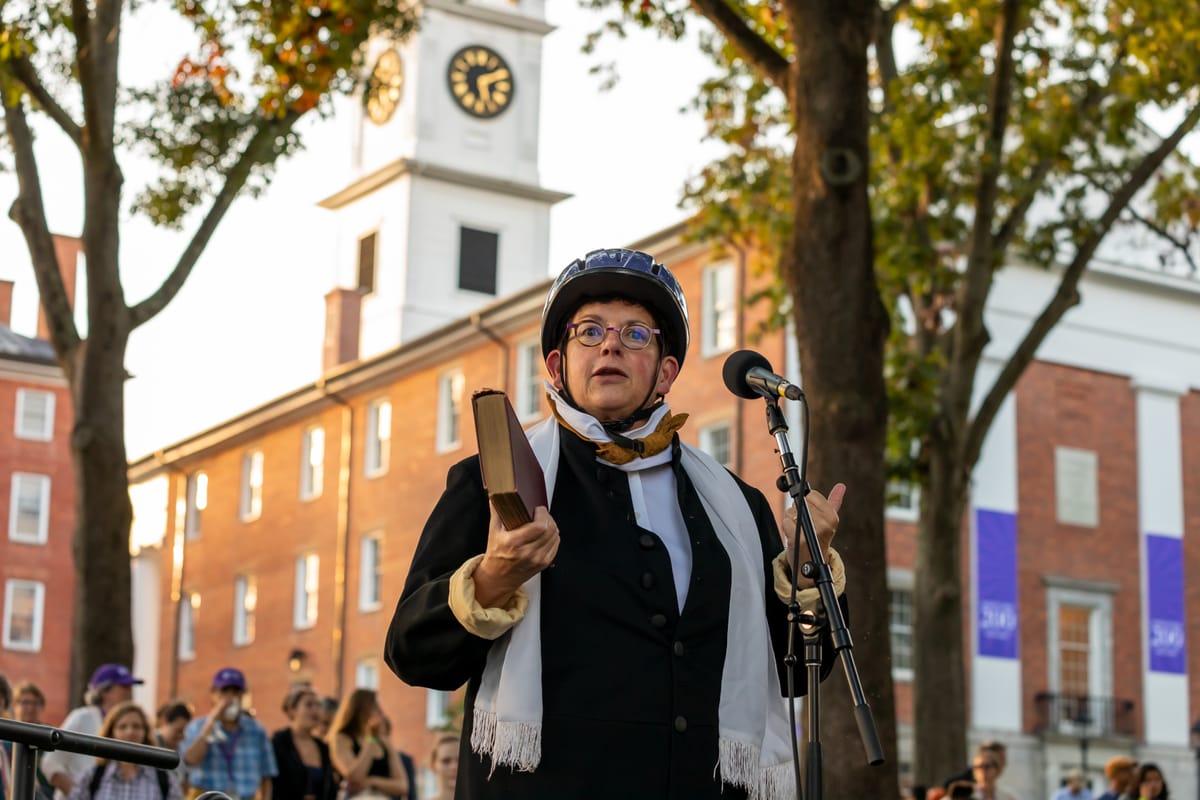
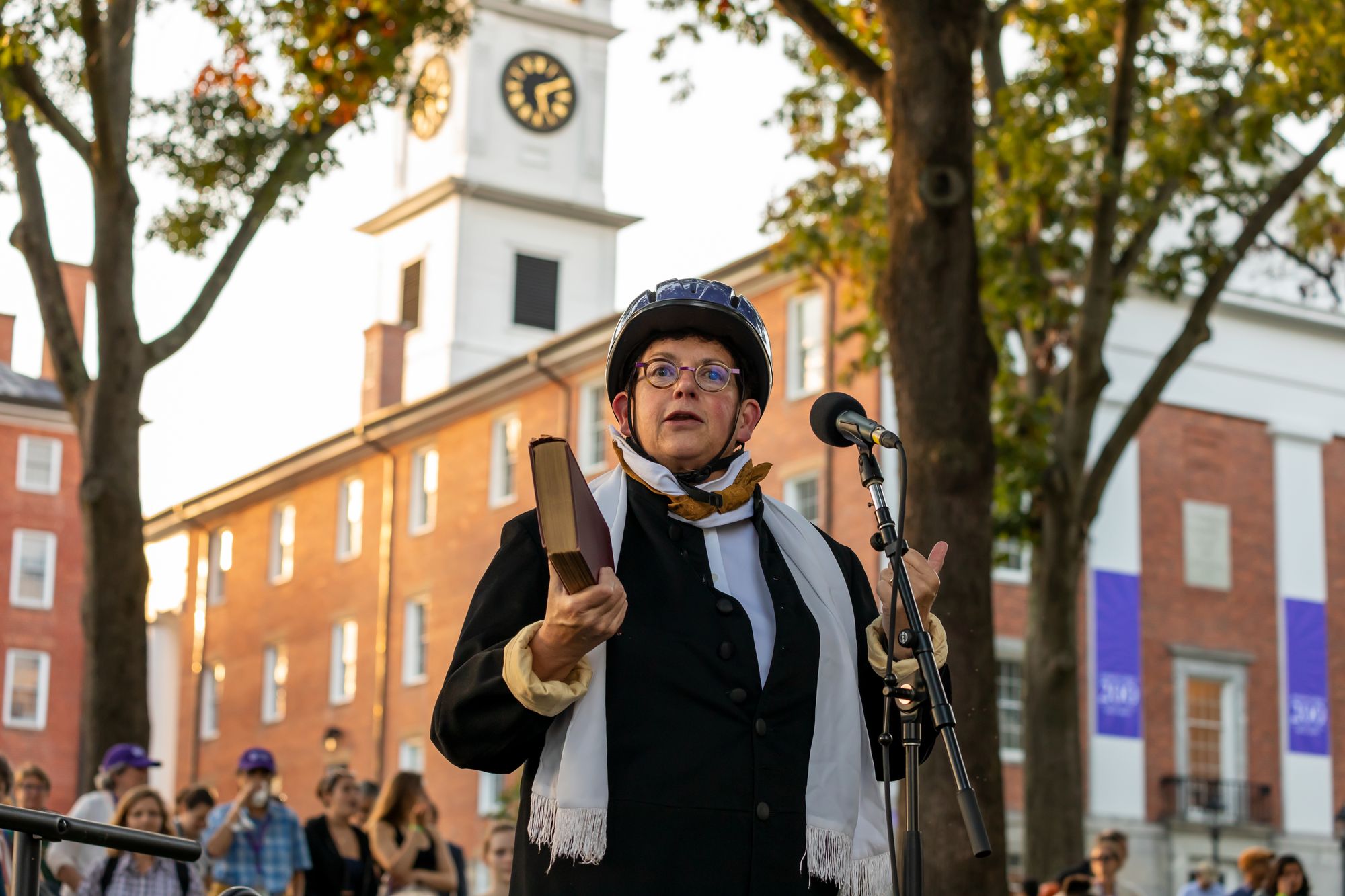
Carolyn Arthur “Biddy” Martin has been the president of Amherst College since 2011. During her time in office, Martin has guided the college through a pandemic and helped ascend to new educational heights. Under her leadership, the college has attracted the brightest minds of domestic and international spheres, hired 123 new tenure-line faculty members, grown its endowment to $3.7 billion, made headway on critical diversity, equity, and inclusion initiatives and completed a remarkable number of capital projects — namely, the Science Center and the Greenway Residence Hall project. Martin spearheaded plans for the construction of a new Student Center. The Student had the privilege of sitting down with Martin to conduct an exit interview before she moves on to serve as president-in-residence at the Harvard Graduate School of Education.
From Rural Virginia to the Pioneer Valley:
Sophie Wolmer: From the get-go, you have undoubtedly been an unprecedented president — with regard to gender, sexual orientation, and educational background. Looking back on your presidency, how has it been different from the men who held the position before you?
Biddy Martin: This question is interesting because nobody ever asks me what it’s like to be the first lesbian president. I am frequently asked what it is like to be the first woman president.
I will say that the answer to this question is probably better discerned by other people out there — they are a better judge than I am, because I’ve only ever been myself. So it’s really hard to compare. I really don’t know what, if anything, has been different; I only know how things feel to me.
I think that it’s great that Amherst had its first woman, lesbian president — even though not everyone would agree with that. There are those who leave critical and angry messages, usually from outside the campus. Their somewhat insulting comments have to do with gender, sexuality, or my appearance. In that sense, there is a difference in terms of the feedback I receive from outside work.
SW: You have spoken before about your humble beginnings in Campbell County where educational opportunities were limited. How did your childhood in rural Virginia shape your personality and contribute to your ambitions?
BM: It’s a hard question, but it’s interesting. I think what stands out about my childhood is that it was certainly humble compared to where I am now. Especially these days, I have been reflecting on it more frequently. Thinking back, it is less that it was modest and more that it was so different. I grew up in a familial environment where being Southern — and everything that went with that — was very, very important. I never seemed to fit into the mold of Southern womanhood that my family had in mind. The limitations I faced in terms of education also had to do with what my family valued. I went to Brookville High School which seemed fine at the time. It was not the kind of high school that a lot of people who go on to Ivy League schools would have gone to — it didn’t even get me into the honors program at William and Mary, though I was the valedictorian.
Back in the ’50s and ’60s, my parents did not think that girls needed to go to college or should go to college. They thought that higher education had a bad impact on women. My mother was convinced that William and Mary made me really sad. She thought that that kind of education, with an academic emphasis, was just bound to get in the way of one’s happiness, which didn’t turn out to be true for me! Not only did they think that girls shouldn’t go to college, they were afraid that they didn’t have the money to send me to college.
In the end, it worked out because my guidance counselor, who was also my math teacher, helped me get into William and Mary. Eventually I went on to graduate and continue a life-long journey in education.
SW: In an interview with Emily Boutilier, you mentioned that education is not just defined by learning, but by unlearning. Do you still believe this to be true?
BM: Definitely. Amherst is a great example of this. A good liberal arts education forces you not to just think intellectually, but also to examine who you are, where you fit in, and what assumptions you make. Of course the questions that shape a student’s educational path inevitably change, though not necessarily at the root.
I will also say that people can get a great education and become critical thinkers without losing the personality and character that they come into it with. But I think that redefining the questions that guide learning makes a huge difference. Certainly, for me, unlearning a lot of what I had been taught when I was a young woman was a crucial part of being able to learn anything new. I knew that I couldn’t buy into the perspectives of my parents. My education gave me the language to figure out what it means to have a different perspective and gave me the tools to develop my own perspective.
I actually unlearned a very strong Southern accent, but not on purpose. It is probably the couple of years that I spent in Germany that finished off my accent. It really upset my parents when I returned and they noticed how my voice had changed. I remember my mother picking me up at the airport and saying, after I had spoken a little bit, “We didn’t raise you to talk like that.” That kind of unlearning, which I did not intentionally do, felt threatening to them.
Returning back to the discussion of my childhood, I grew up feeling different, and came to see that I would need to pave my own way even if it meant leaving. A lot of Amherst students go through similar processes when they leave their homes.
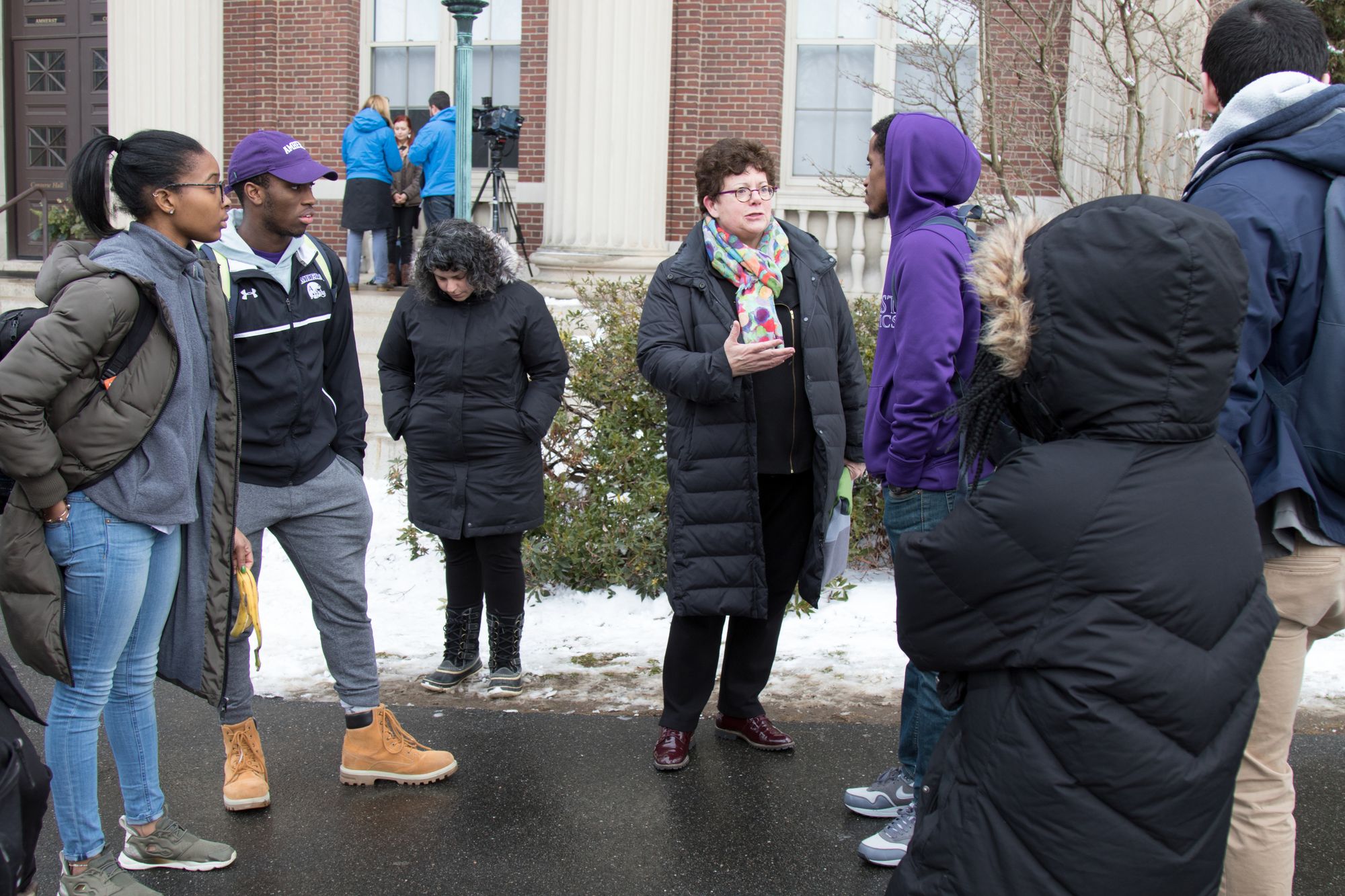
SW: Over time, you transitioned to senior roles at Cornell and Wisconsin. Why did you decide to move into the sphere of institutional leadership? Was it a conscious choice or one that occurred organically?
BM: This is a good question, because I was very happy being a faculty member in the German department, and in what was then called women’s studies at Cornell. It was certainly more organic than it was intentional. I never had the ambition to be a college dean or president. I don’t think I would have even known what that meant or entailed before I actually became a faculty member. It really all began when a wonderful dean of arts and sciences tapped me on the shoulder when I was serving as chair of the German department. He said, “I think you would be a really good Associate Dean, would you like to try it?”
I was very fond of him. He was an extremely interesting, smart faculty member, and scholar of an influential journal at the time called Diacritics. And so when he became dean and asked me whether I wanted to work with them, I just thought that I’d try it. I guess I didn’t look back. Each step that I took from then on followed accordingly.
Becoming provost was a big surprise. It’s actually a very funny story of how it all happened. The president of Cornell called me on the phone when I was senior associate dean and said, “I would like you to think about being provost, because Provost Randel is going to be president of Chicago.” I just assumed that he was asking several people to think about becoming provost, so I never got back to him.
Later, I was talking to one of my friends from grad school, telling her about the offer, and she asked me why I hadn’t called him back. She said, “You didn’t call him back? You didn’t answer him?” I told her no, that I thought that he was probably considering several candidates and that he would get back to me if I was the choice. She let me know that that was probably not the case — that he wouldn’t ask more than one person to think about being provost. I called him at home. And his wife [whom I knew] answered the phone. And she said, “I’ve been wondering why you hadn’t called us sooner.” So anyways, I never had the ambition of being a provost.
Though, I loved that job. I remember feeling like a kid in a candy store. I wanted to go to all of the colleges that I didn’t know much about so that faculty could tell me about their work: engineering, agriculture, veterinary medicine, industrial and labor relations. Graduate students and some undergrads would take me into their labs, and introduce me to such fascinating research. From the beginning that job opened up worlds of intellectual life that I had not really contemplated since college. I had gotten so specialized, once I had chosen a field, gotten a Ph.D. in it, and then taught it year after year.
The purposeful move that I made was deciding to go back to the University of Wisconsin as chancellor.
SW: After occupying such noteworthy positions at larger universities, how was the transition to a smaller undergraduate institution?
BM: Though I really liked being chancellor and provost of these large universities, I really missed being closer to students and other faculty. I received my education from a liberal arts college and what I loved most was the proximity to the faculty. I did not know much about Amherst before I was being considered for the position — just as I didn’t know anything about Cornell or Wisconsin or any other place growing up. But I did a lot of research on what faculty here were doing and read a lot of [The] Amherst Student editions. It seemed to me that this was a place where I would love to spend the last part of my career.
Amherst was not just highly regarded intellectually, but it was also a place where faculty and students had close and intense relationships. These relationships can form at large research universities, but it’s rare. I missed the close connections more than anything else.
Another reason, besides the great academic reputation, was the concerted effort that former President Tony Marx made to diversify the student body. There is one question in particular that I remember asking the search committee that I still have now: Once you achieve the level of diversity that is greater than the critical mass, what do you do to ensure a sense of community and a sense of belonging? How do you ensure that everybody in the community feels that they have the same possibility of having a voice, doing well, and feeling ownership of what the institution will be going forward? This question still needs to be answered.
We are not nearly as good as where it could be. I think that that’s a future opportunity — and a worthwhile journey. Obviously, the country is proving to us right now how badly we need change and need to come together. Amherst has done more than most elite institutions, but we still have a lot to do. The school is ready to have someone new, with new ideas to push this vision forward.
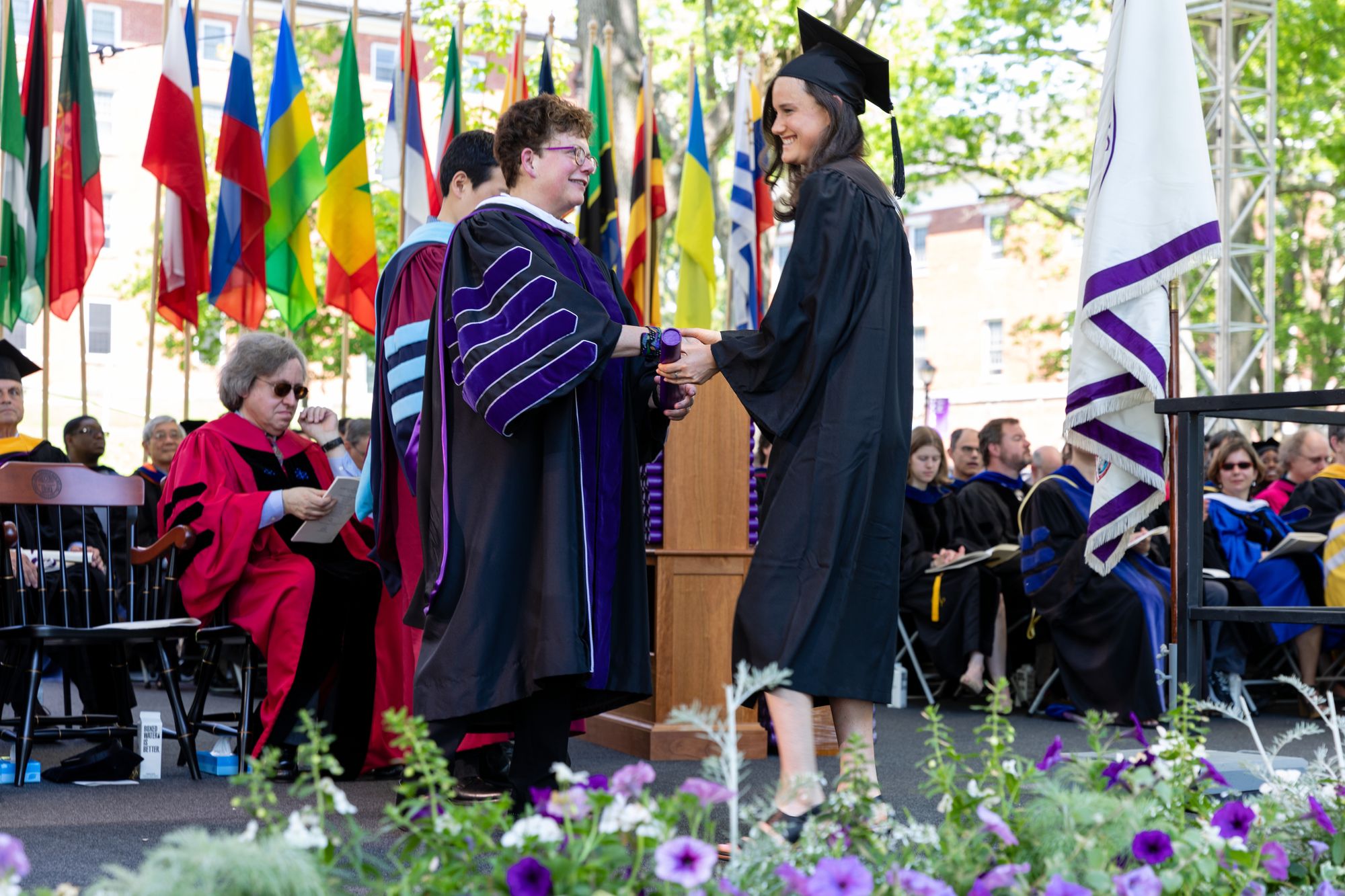
Assuming the Role of President
SW: When you stepped into the role of presidency, what was the state of the college in terms of academics, finances, and even social status? What values were emphasized that you appreciated, and what needed amending?
BM: The college was in good financial shape and academically excellent. I realized early on that I was going to have to spend a lot of energy on some of the administrative units that were a little bit “Mom and Poppish.” They weren’t as coordinated in the ways that the other places I had worked at. At first I was conflicted because streamlining administration processes is a double-edged sword: it’s important to preserve what felt like home life for the institution, but also, it is critical to realize the needs of currency faculty and students, which requires continual progress, right?
The biggest problem that I realized Amherst had revealed itself the spring of my first year at Amherst: the sexual assault crisis. After having several months of a wonderful transition, despite a big storm that shocked the campus for a while, this challenge was the most significant. This was a significant part of the beginning of the presidency and was a good reason to try to update the college’s policies and processes.
SW: How would you characterize the attitudes of students, faculty, and staff when you assumed the position? Were these groups hopeful? Was any one particular group calling for change?
BM: The most vivid memory was the desire for the administration to be more observant of faculty governance. Once again, though, the main issue that was brought to me was by students, and that was the problem of sexual misconduct. And on the part of staff, people wanted a stronger sense of belonging and appreciation. This can be hard at educational institutions. Students and faculty are so at the center of everybody’s work. And sometimes, the people who are doing the work that’s required to ensure that education can occur, may begin to feel as though they are overlooked.
People seemed hopeful when I got here. I think their hope was partially a result of what had been done under Tony’’s leadership and the direction that we were headed [in]. People hoped that we could expand the diversity of the student body, the faculty, and the staff while also maintaining academic excellence at the highest level. Those are the things for which Amherst is now known. What a great reputation to have.
SW: Thinking back to that first year of the presidency, were there any bumps in the transition? With the benefit of hindsight, would you do anything differently?
BM: That first year, the one thing I wish that I could change is the experiences of young women who felt that their situations of sexual misconudct — even rape — had been dealt with poorly. I wish that this had not have been the case. That was probably my biggest wish at the end of that year.
In terms of my own experience, the first big bump was the day after I arrived. There was a big storm the day before the DeMott Lecture. That year, the speaker was now Senator Chris Coons. Because of the weather, he was very late getting to the lecture itself. The storm had affected the entire East Coast and we here at the college had no way of knowing what time he would arrive. So, someone advised me to get up in front of the first-year students in Johnson Chapel and entertain them. This turned into an hour and was totally silly. I hope that no one remembers my effort, because it was a complete failure! But anyways, everybody who heard it at the time still laughs about the whole endeavor. That was my very first bump in the road: the storm, the speaker coming late, and me standing there for an hour not being able to engage people very well. Perhaps it did provide a little comedic relief to everyone.
SW: How have you evolved from the woman who assumed the position 11 years ago? What advice would you give her?
BM: The only advice I would give myself back then was: Be more confident than you felt at the time. It turned out very quickly that I felt at home here which was kind of odd. Part of it was the beauty of the place and the similarity to growing up at the foot of the Blue Ridge Mountains. Part of it, obviously, was just the quality of people. But for whatever reason, I felt at home and really loved the job. That is one reason why it is so hard to leave. But, looking back, I’m glad that I made the decision to be president of the college. In that respect, I’m more content than I was 10 years ago.
Next, I’ll be moving to D.C., which is where Gabi and I will live. We will make trips up to Cambridge and also hopefully back up to Amherst. It is going to be very different, though. I’ve never lived in a big city my entire life. D.C. is also beautiful. It’s a “Southern city” in the sense that it isn’t full of tall buildings but is full of gardens — a unique metropolitan landscape.
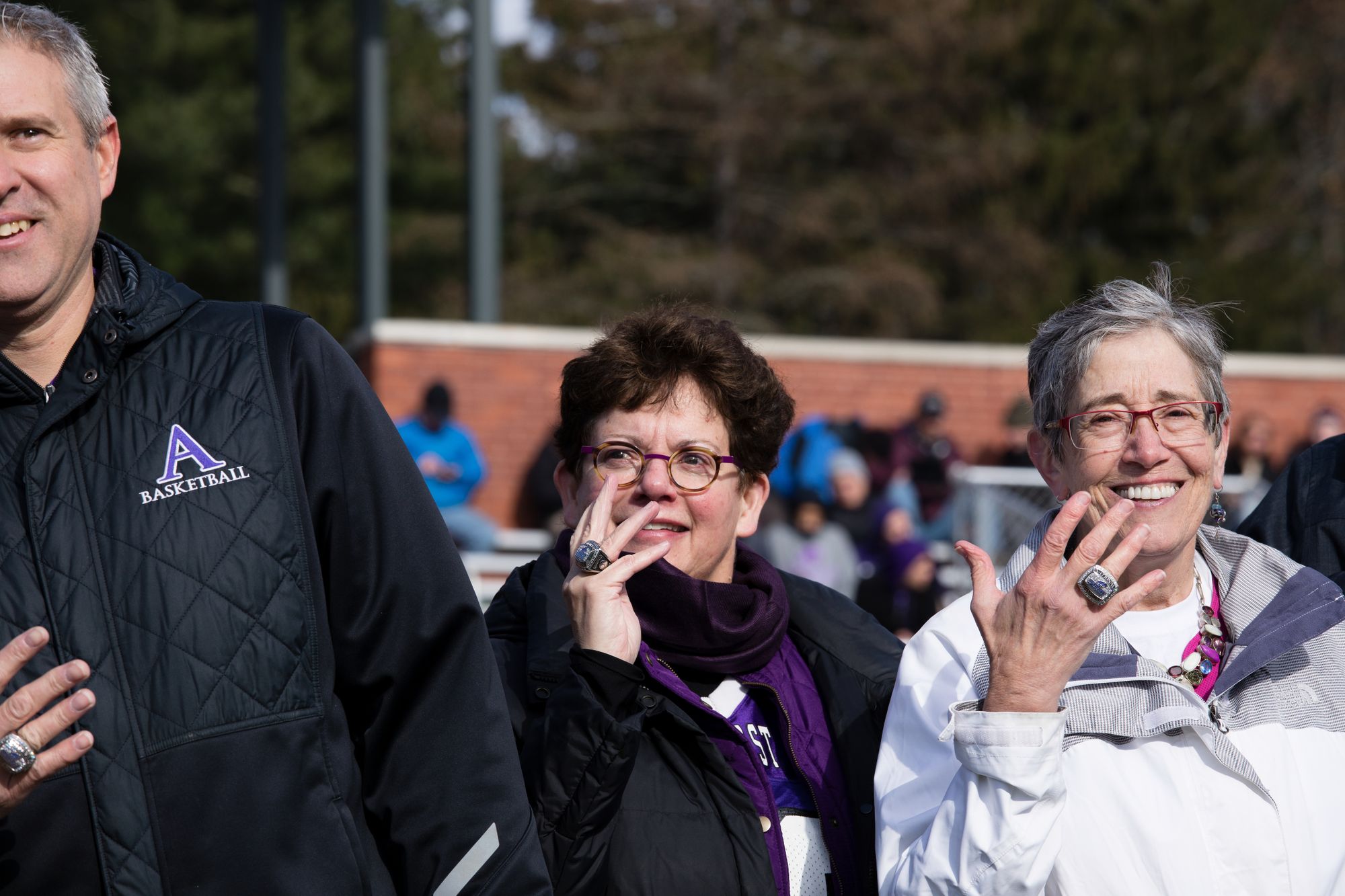
The Eras of The Presidency
SW: How has your vision for the college evolved during your time here?
BM: Over time, it has become more clear to me that Amherst students need a way to achieve a greater sense of community to overcome their differences. That is why I started to think about how the facilities, buildings could help to accomplish this goal. Soon I became excited at the idea of having a real student center. One way that my thinking evolved was after the Science Center was complete. That seemed to be a great success, and we had a range of options for what we could do next. I pushed very hard for a “real” student center, by which I mean a place where students with a wide range of interests would enjoy gathering, and just being together. Not necessarily in order to see any particular person or for any particular reason, but just to find other students. You could find an activity there, or interesting extracurricular activities. I think that that is going to be a spectacular resource. Unfortunately, I won’t be here for the rest of its process, but I’ll be back to see how it turns out.
SW: The idea of a common gathering place is the reason, I believe, that people love Val so much. There is only one dining hall. Because of this, it is almost certain that you will find people that share passions with you upon entering for a meal.
BM: Yes! And as you, I’m sure, know, the Student Center is going to have a dining commons within it, which I think is ideal. First, Val has outlived its usefulness, its infrastructure — even though it has been such a great establishment for the students here. It was going to have to go anyway.
SW: As you think back to your foremost accomplishments as president, which were the most important to you? Why?
BM: First, I will say that none of the accomplishments are just my own. They have all been such a team effort. But the things that I feel the best about have been our ability to increase the size of the faculty. The quality of the faculty that has been hired here is remarkable. [The college] just went through another batch of tenure and reappointment cases, and I must say that I feel very good about the future of [the] college.
Another accomplishment that I am proud that I was a part of was the Powerhouse. This was my first project, and it was a really fun one to me. My goal was to give students a place where they can hang out and have events, parties. I remember saying to the senior staff, “We have to identify some space where students can have social events!” At this point, [then-Chief of Campus Operations] Jim Brassord went and talked to the facilities team. One of them mentioned that what is now the Powerhouse was a storage area for equipment. He volunteered that the items in storage could go somewhere else so that the Powerhouse could become what it is now. The entire project was really a fun, collective enterprise that came from a genuine interest in finding a space for students and getting the job done quickly.
I am also proud that when I was a new president, I went to the board chair and said that the Science Center — as it had been planned — was not going to work. He was receptive, switched gears, and now we have a Science Center that both faculty and students like so much.
Besides this, the quality of the students and increases in financial aid that we’ve been able to offer make me feel good. Also, the staff is so talented, dedicated, and devoted to students, I can take no credit for that. But it really makes me happy to see the work that they do, and to see how students benefit.
As we turn to the next project — the Student Center — this makes me the happiest. Fundraising for the Student Center through the board’s and alumni support will ensure that it becomes all that we are hoping: a place where people can gather for community events of all sizes and kinds.
SW: What makes a person a great leader is their propensity to choose individuals who can do their jobs effectively, but also creatively. Being able to select individuals who are able to satisfy the needs of students, faculty, and staff is what makes a difference on the individual level for the people at the college.
BM: Yes! I agree. That is some of the most satisfying work: hiring people, choosing senior staff, and then going on to work with them. I did a lot of athletics when I was younger, and loved being on a team. And I think that this is what I love most about administrative work, unlike a lot of scholarly time which is spent alone. Of course, not all scholarly work is done independently — scholars are always interacting with their peers and developing ideas together. But, a lot of the time spent working is solitary. Alternatively, when part of an administration, you’re working in teams with people who have different areas of expertise. And when you put it all together, if you’re working well together, something really meaningful happens: a project results that achieves a goal and serves other people. On the administrative level, one gets the satisfaction of, “Okay, we did this,” but also the pleasure of knowing that the product will be useful to others.
SW: What mistakes have you made during your presidency? What did you learn from them?
BM: My mistakes are probably just as important as my successes. I have learned so much from them. Off the top of my head, I can’t think of a very blindingly obvious mistake, although I’m sure that I have made some. There are lots of small, frequent, and correctable mistakes. For example, I may not have the right expertise in a room at a given moment. These do not cause total breakdown if you catch them. A lot of my work involves learning, listening, and seeing what’s not working. Then I shift gears to accommodate those changes.
I’m not sure I would call it a mistake, but one thing I would change is the time that we began our DEI [Diversity, Equity, and Inclusion] work. In terms of the DEI and anti-racism work, I wish that we had started sooner. In a way, this is a missed opportunity, and now our progress has been slower than I would like. We still have a fair bit of work to do.
[Amherst] Uprising was the best example of the importance of listening to hear what various groups on campus need. It can be students, faculty, staff or even other administrators. The Uprising was an instance where students were saying something about their experience, what they were going through. Reaching back to my time in college could not help in this case. Here, what was critical was listening to the voices.The Uprising was an extraordinary opportunity that forced others to listen to what it felt like to be a student of color. After we heard their concerns we were able to address the things that needed to be changed the most. Their concerns dictated the direction and vision of our priorities.
I wasn’t surprised to learn that a lot of our students of color and first-gen students were having a very difficult experience at the college. It’s clear that Amherst started to change in composition before we were able to think hard about what it would mean for the school itself. That is not to say that the college should have waited until it was fully prepared to make changes to the composition of the student body. But, it was important to recognize the downstream effects of the shift.
The same issue surfaced when the college became coed. If you talk to women who were in the first classes with both men and women, there are some surprising stories about having to use bathrooms with urinals lining the walls. This is an example of how the college was not quite ready for the decisions that were made by the administration.
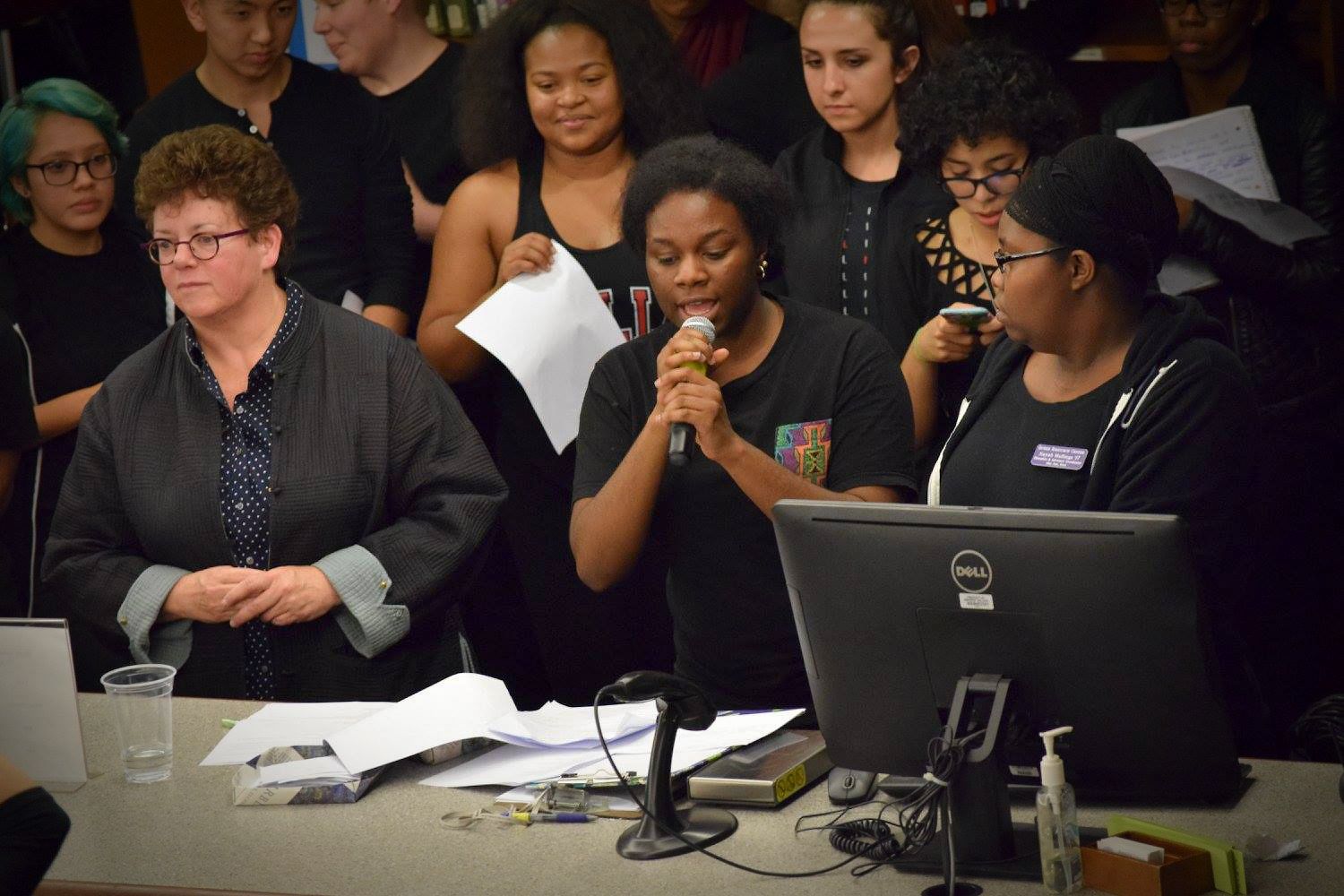
SW: The Covid years have been undeniably difficult. How did you motivate yourself, your staff, and the students of the college to keep pushing forward during such a strenuous time period?
BM: I didn’t have any problems staying motivated. This is partly because I feel an enormous sense of responsibility — largely due to my personality, as well as the job of [being college president] itself. What has kept me going is this sense of responsibility but also that I like a challenge. The truth is, the challenge of the virus has kept me on my toes. I enjoy the challenge and the journey, just as much as the outcome.
I started reading about Covid very early on. I had heard about the virus when I was in California at the end of December 2019 and January 2020. I first read about a military base just north of San Diego that had a spread of cases before the Seattle crisis. First turning to Twitter, I tried to figure out who to follow for scientific sources. There was not much about science at first, but more news-based information. There was some science coming out of China. Early on, at the beginning of February, I knew that this could be bad. And so, I called on alumni of Amherst who are major scientists and public health experts.
To be honest, that part was really intellectually interesting. I would get three or four alumni on a call at a time, and would ask them everything that they knew about the virus — how they would handle it, what they thought that the college should be doing, other people that would be useful to consult. Reading and consulting was motivating and fascinating. Then I started to worry because it was spreading in Massachusetts and because Spring Break was coming. The group that I had tapped for knowledge concluded that it was dangerous to have everybody go away and then return.
Though motivation was never truly a concern, there is a lot of fatigue on the part of staff at every level, including the senior staff. This is because we’ve been trying to keep the Amherst enterprise going in addition to monitoring the virus. I feel good about what we’ve kept going, whether it’s the Student Center project or supporting faculty and staff and students.
The sheer magnitude of the crisis was exhausting at times. I am so proud of the senior staff and what they managed to accomplish in the middle of the greatest pandemic of the last 100 years.
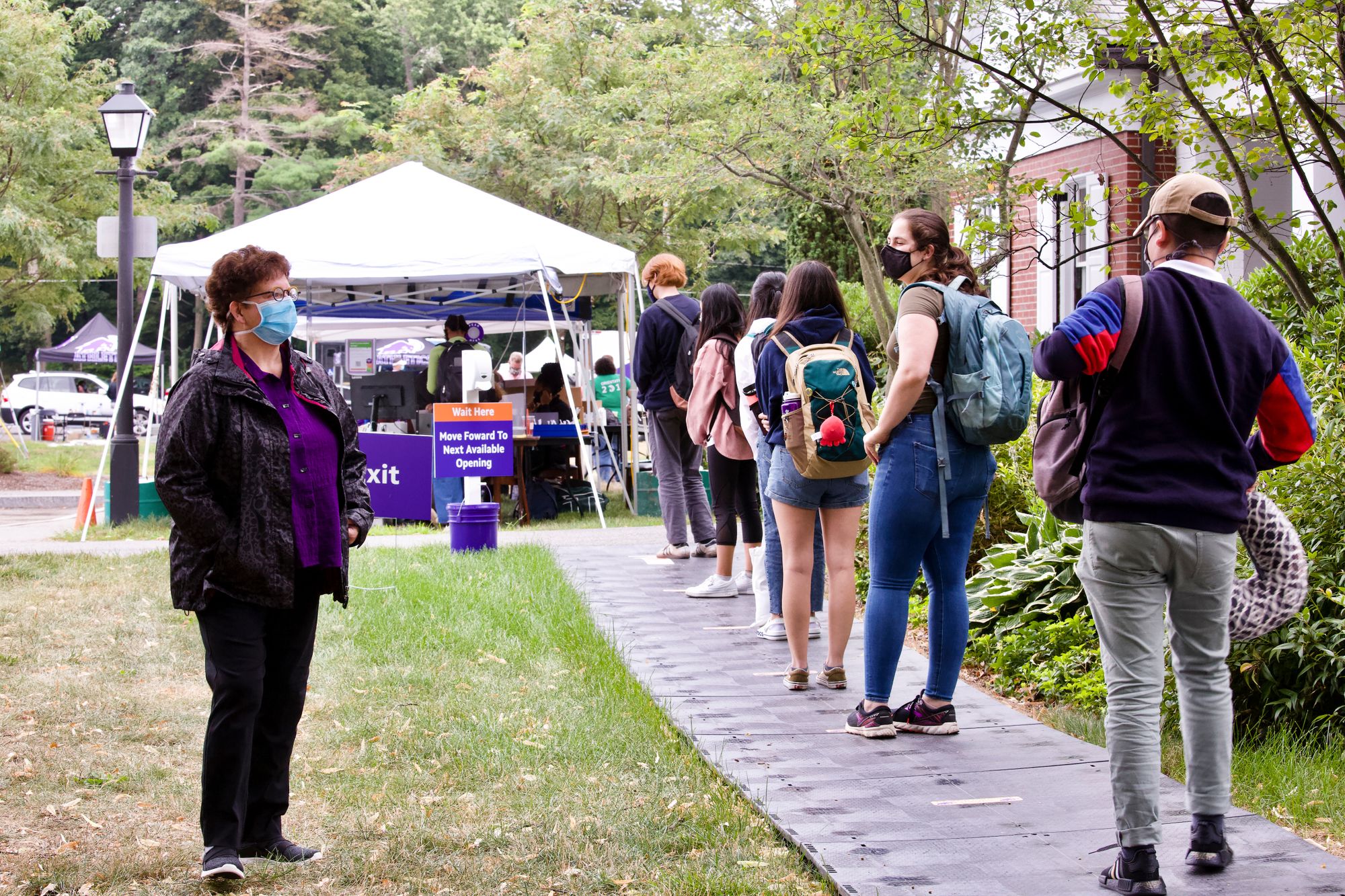
The Martin Support Crew
SW: Over the years, I imagine that many people have been instrumental in helping you make critical decisions for the college. What boards and individuals have been most influential and significant?
BM: I’ve talked about how influential students have been, but I will mention it again, because it has the virtue of being so true. Faculty are also very influential. Without naming any particular people — I’ve gotten to know them better than others — they have helped me learn the culture of Amherst and have been good advisors throughout my time here. Being close to the faculty and having them as a resource has been a big help.
The people are what make my job so rewarding. I have had much fun with others in the President’s Office. First of all, they are all so talented, and I see them more than I see anyone else. I initially learned the inner workings of office-based work through my mother, who was a secretary at an elementary school out in Campbell County. I always thought that she pretty much ran the school, because the principal would usually be out hunting or fishing. It’s partly the impact of seeing my mother in a really low-paying job and being able to run the place that modeled how to have a happy and successful office environment. It’s all women in my office now.
Some of the people who’ve left were really among my closest team members. [Former Chief Financial and Administrative Officer] Kevin Weinman became the president of Marist. Jim Brassord was another incredible figure who just retired. They are both rockstars, and such nice people. Kevin and Jim were both so dedicated to Amherst while they were here. Jim will always be a close friend of mine and an honorary Amherst resident forever.
When I found out the degree of sexual misconduct and sexual assault at the college, I asked [Chief Policy Officer and General Counsel] Lisa Rutherford to leave the University of Wisconsin, where she was general counsel, and come to Amherst. I’ve known Lisa for a long time. She’s a good friend, advisor, and just a kind person. There’s also Betsy Cannon Smith, who’s head of advancement.
I also cannot forget [Provost and Dean of the Faculty] Catherine [Epstein] — what a marvelous woman. I feel like one of the best decisions that I made as president was to have Catherine become provost. She has gotten so much done and is so easy to work with.
Another really good choice was Matt McGann, the head of admissions. David Hamilton, who’s heading IT, is also a remarkable man. I enjoy working alongside them, and will miss spending time together.
The board has also influenced [me] significantly. Amherst is lucky to have a great board of trustees — the best I’ve ever encountered. I think this is because it’s relatively small, and made up of people who really love the college. They’re interested in what students think, how faculty are doing, and are interesting people. It’s really been a pleasure working with them.
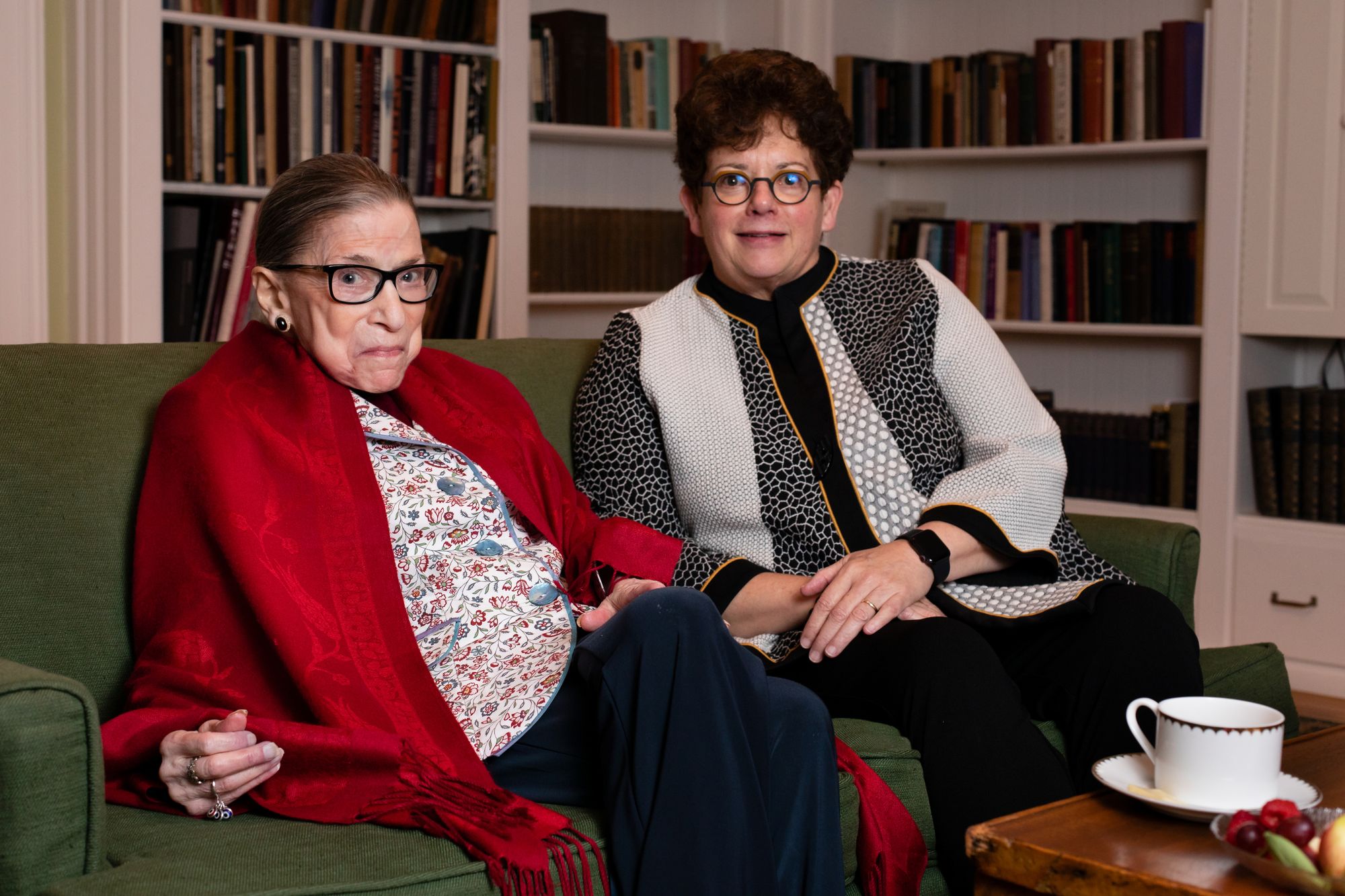
Continuing Her Career in Cambridge
SW: You have announced that you will be transitioning to president-in-residence at the Harvard Graduate School of Education. When were you offered this position and why did you decide that it was a fitting next step?
BM: When [Harvard] called a couple months ago, I was thinking that it will be hard for me, given that I’ve been in these kinds of positions for so long, just to retire and not have any work to do. And so, when they called me up and said that they’’d like me to be a professor and president — to teach a seminar once a week — I thought, “Well, this is actually great, because it’s not full time.” It’s teaching, which I really miss doing. A lot of the previous presidents in the residence have done some of the core classes remotely. This sounded ideal because I’ll be in Cambridge a fair amount of the time anyway.
A very important third factor is that I do want to write and read. This will give me an opportunity to keep thinking, reading, and interacting with other people who are interested in similar topics.
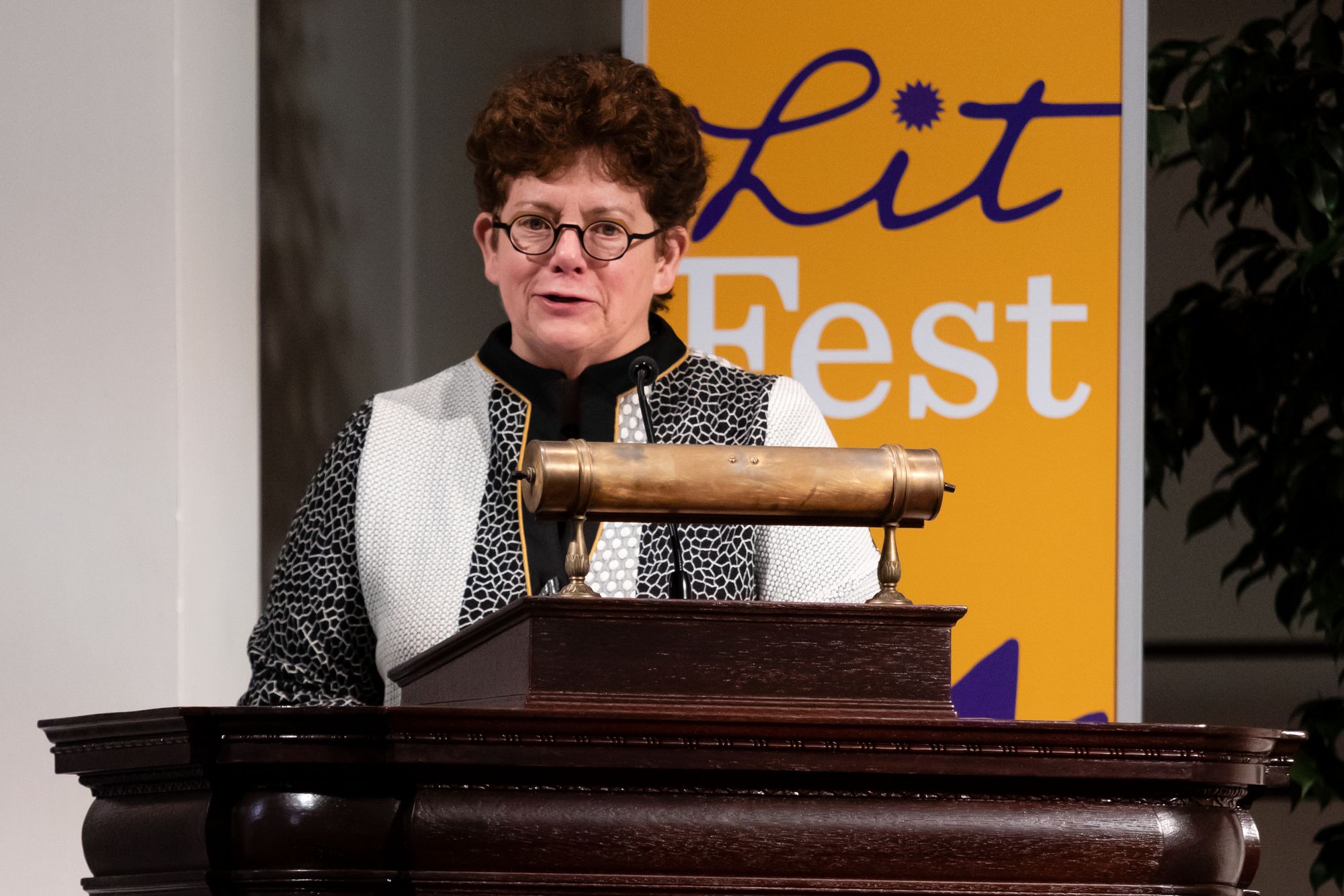
Looking Forward: A Changing of the Guard
SW: How did you decide that it was time to step down as president? What influenced this decision?
BM: Gabi and I just sort of looked at each other and asked ourselves, “Do we realize that we’re not going to live forever?” Our answer was, “Yes, we do.” When we came to that conclusion we determined that it would be good to have another chapter where we could travel, spend more time together, and do things that we enjoy. Another motivation was that I would like to write. As president, there’s just not any time to do writing. And so I decided that 11 years is a good long run. And even though I’ll miss it, and it was hard to get to the decision, I think that it’s the right one.
It will also be good for the college. It used to be that people served in these jobs for 20 or 30 years, but now times have changed. The college will be well-served by having somebody with brand new ideas. It’s good for an institution to have a new mindset. I’ve had a good run, and have uncovered that there are a lot of things that need more work. The college needs somebody with fresh eyes to come in and take a look — somebody with different experiences, different backgrounds, different thoughts.
SW: What are you looking for in the next president? What qualities would you like to see the next president have?
BM: I hope it’ll be someone who agrees that the overall journey that Amherst has had is a worthy one. But, I would also like it to be someone who has their own ideas about what it involves or entails. I want them to have their own path in the greater trajectory of Amherst College’s history. It will be ideal if they have a different personality and interest. One thing that must be the same in terms of qualities is somebody who loves education, loves being at a liberal arts college, and is close to students and faculty. With the work of a small liberal arts college, unlike a major research university, your everyday life is rooted in relationships with faculty, students, and staff.
Presidents make some difference. We don’t do everything, it’s really the ideas that bubble up from faculty and students and staff, but a vision of a president and board can guide the generation of these ideas. The real key to a successful president is listening, synthesizing ideas, putting them together, and then trying to gather the support and the resources to make them come to fruition.
SW: Are you involved in the selection process for the next president?
BM: No, I’m not involved at all. I’m pretty excited to find out who the president turns out to be — I’m sure that it will be announced by Commencement. I know that it seems to be going well based on what I heard at the board meeting this past week.
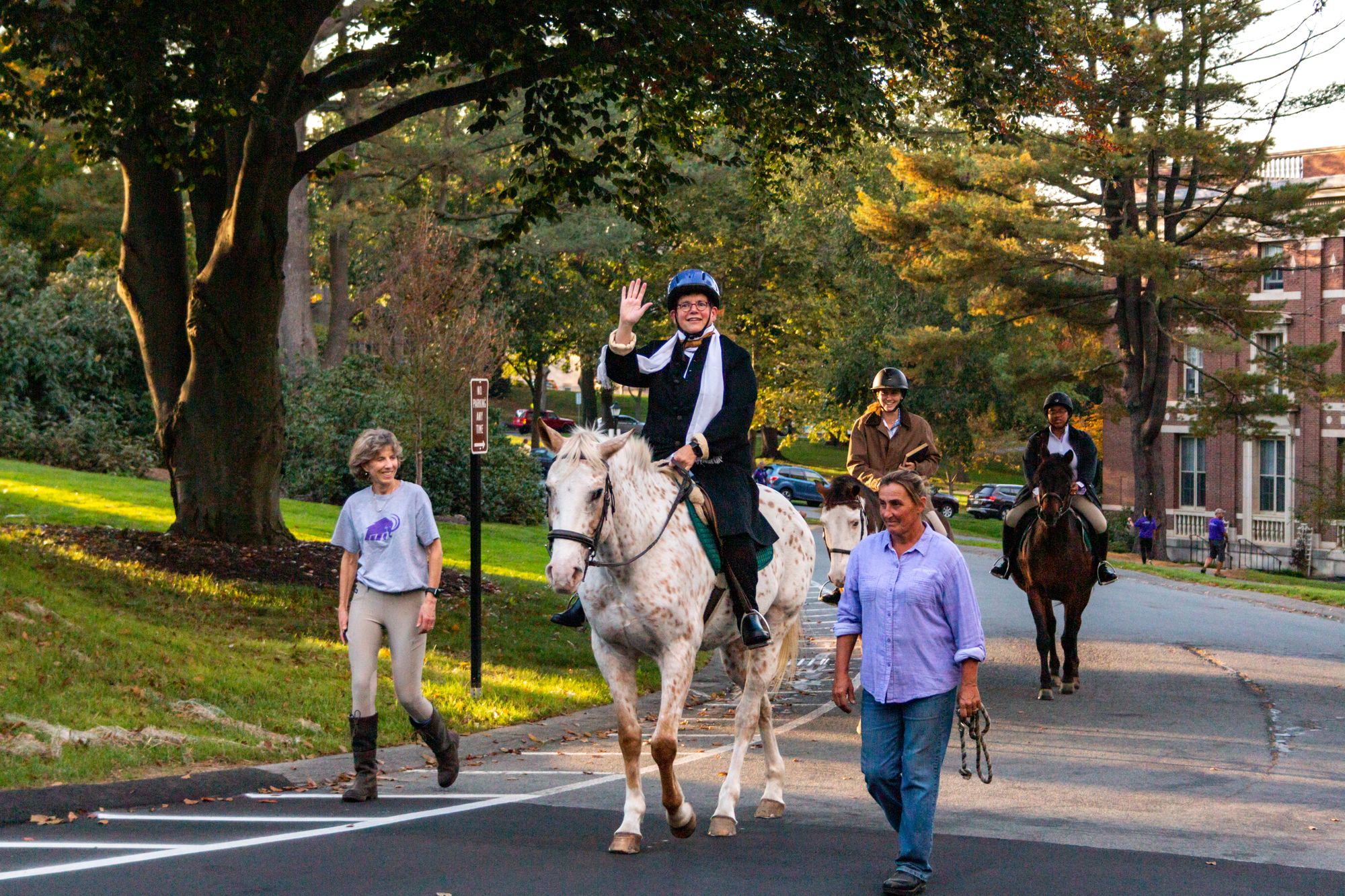
SW: What makes this college great right now, that you would like to stay the same?
BM: Oh, that’s easy. The first thing is the combination of the quality of students, faculty, and their relationships. Then, of course, there is the talent and the dedication of staff combined with the support of a really generous, good board. Having these assets in the context of a beautiful location is what makes Amherst great. It is remarkable that our makeup reflects the actual diversity in the world. I cherish the fact that we have gotten to a place where diversity is appreciated. These things — the combination of talented people who are devoted to learning, a diverse community with different backgrounds, and unique faculty-students relationship — contribute to the value of the Amherst education.
The intellectual excitement of this place should be protected. In part, we have it because college is a part of being in the world and not closed off. We have managed to capture the genuine beauty and fascination that people can have about a larger world here. We have fostered intellectual intensity by drawing people from all over.
SW: What further changes do you foresee that could push Amherst to even greater heights?
BM: Bringing in some new fields is the first thing that comes to mind. Keeping pace with emerging disciplines will help Amherst be a part of developments in the sciences and the humanities, the social sciences.
I think that new facilities will help as well. Having people together in this [Aliki Perroti & Seth Frank] Lyceum from the history department, the [Center for Humanistic Inquiry], and the classics department is going to bring a liveliness to the humanities that is crucial these days. Also, consolidating the Counseling Center in one space will help with challenges in mental health that we all face.
In the end, it is keeping pace or even being out front of field-specific progress. Taking education in new intellectual and pedagogical directions has impressed me over my time here. The amount of experimentation that the faculty has done, often inspired by or helped by the Center for Teaching and Learning, is what moves this place forward. They have shown that the classical ways of teaching are not the only ways. Even though [the classical ways of teaching] are not dead in my view — I mean, a good lecture is still a great thing to hear — our faculty has the curiosity to try some innovative strategies. I think that this will continue, even after I have left. I’m sure a new president will continue to push and support this kind of innovation.
One thing that I have not put too much focus on, but that I think could be a big benefit to the college, is developing strong relations with the community of the town. The work that Jim Brassord has done on behalf of the administration has been good, but there is more to be done. I’m really happy about the Drake, a new music performance space in the town of Amherst that our music department is going to use a lot. The success of this project shows that it is to the benefit of everyone to keep the town a lively, thriving place. But then there are all these unforeseen things that new leadership will bring that I can’t predict. That’s the fun of it. I’m excited to see what a new president does here.
SW: Do you plan to remain available as a mentor and advisor for the next president? Or will you leave them to determine their own path?
BM: They’ll figure out their own path. I will be as helpful to the new president as the new president would like. But I think typically, new presidents need and want to find their own way. I remember that when I came for an interview here, I was introduced to Tony. Tony invited me over. He and his wife were having breakfast and their son was there. But anyway, Tony then walked me over to the quad and we sat in those Adirondack chairs. I think that this was what sold me on the job. We talked for a long time about everything. But again, it’s up to them. There are plenty of other people who I’ve kept close, who know what is going on: the board, the senior team, the faculty — especially the Committee of Six — who will be valuable sources.





Comments ()